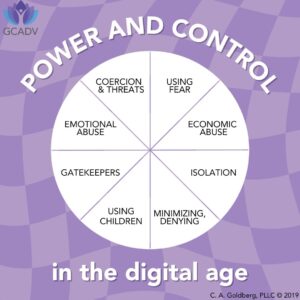
When talking about Domestic Violence, most people are familiar with the Power and Control Wheel. In an era where technology intertwines with our lives, it’s crucial to shed light on how digital tools can be misused to exert power and control in relationships. From cyberstalking to constant surveillance, this wheel illustrates the alarming ways technology can be wielded as a weapon. Being able to identify abuse for what it is, more people will have access to the resources they need to be safe at home, online, and in their communities. With the rise of social media, abusers assert control and instill fear, exploiting digital platforms to monitor various facets of their victims’ lives in new ways. As technology evolves, it becomes imperative for advocates, law enforcement, and society at large to adapt and comprehend the ways in which the digital landscape can be manipulated to perpetuate domestic violence. Addressing and understanding these digital tactics is crucial in creating a safer and more secure online environment for survivors of domestic abuse.
Using Fear:
-Creating fake profiles on dating apps
-Texting/calling from spoofed numbers
-Creating email accounts impersonating people from the past, especially exes
-Calling 911 and saying he/she is about to engage in a mass shooting (aka swatting)
-Using VPN/Tor browser to mask tracks
-Posting on 4chan and 8chan to attract trolls to help harass
-Impersonating victim to phone carrier to get new phone number after it gets changed
Economic Abuse:
–Trying to get them fired by making false claims or sharing intimate images/secrets with colleagues
-Demanding access to online banking
-Using victim’s credit card
-Monitoring spending
Isolation:
–Using the internet to harass the victim’s friends, family, colleagues, boss, new partner-
-Limiting communication with friends and family
-Monitor devices and installing spyware, GPS tracking
-Dictating who you can be friends with on social media
Minimizing, Denying:
–“You can’t prove it was me.”
-“It’s just the internet, you’re overreacting”
-“What did you do to deserve this? You’re lucky you have me” (in situations where offender is impersonating somebody)
-Cops not taking reports seriously – “how do we know it was him/her? What if they were hacked?”-
“You’re probably doctoring all this evidence.”
Using Children:
–Uploading child sexual abuse imagery
-Sending pornography to victim’s child or school
-Using naked pictures as evidence during child custody to show unfit parent
-Framing victim as consumer of child sexual abuse imagery
Gatekeepers:
-Cops refusing to take police reports.
-Detectives failing to subpoena for digital evidence or get warrants for devices
-Prosecutors refusing to prosecute
-Judges not allowing time to obtain digital evidence in family court
-Social media companies not providing evidence to victims or banning violence
Emotional Abuse:
–Humiliating by posting sexual photos online
-Demanding access to phones and computers
-Going through texts/email
-Installing keylogging software to monitor tech remotely
-Falsely accuse of cheating based on innocuous posts or old emails/texts
-Reading old emails and texts between victim and exes
Coercion/ Threats:
–Threatening texts, DMs, chats e.g. “If you dont send nudes I’ll…”
-Threatening to distribute images
-Soliciting secrets, then threatening to publish that intimate info
There are 40+ Domestic Violence Agencies that serve Georgia. No matter where you are, there is help for you.
If you or someone you know is experiencing abuse, please contact the 24/7 Helpline or visit www.gcadv.org
https://gcadv.org/domestic-violence-centers/
GA Hotline: 1-800-33HAVEN
National Hotline: 1-800-799-SAFE
